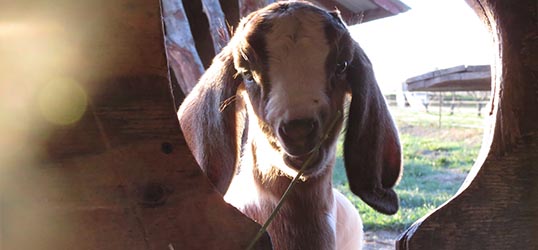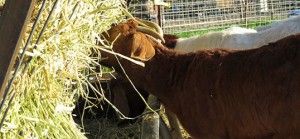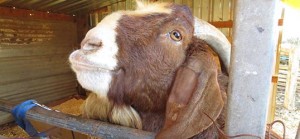
Ida Luis-Hulsey led me out of the first of four barns. She had just finished feeding only a small portion of her goats.
“This is only my sixth year and I’m running 120.” she told me.
By 120, Ida meant 120 goats. Her farm, IJ Farms Boer Goats, breeds and sells breeding does and market goats for fairs. This means these goats are not for commercial use. They are sold to individual customers, who are usually children and teenagers that are planning on taking animals to fairs. At these fairs, the animals are shown and/or sold and life goes on for them. Sometimes they come back for another goat. Other times they do not. But for Ida, these goats are her entire life.
Ida is there when every one of her goats is born. She names all of them because they are not just a number to her. They are more than that. They are life forms that depend on her in order to live. Goats are also rather stubborn and demanding creatures, but Ida does not seem to mind. She would do anything for these goats.

Ida never thought that she would dedicate her life to raising and selling goats. She grew up around dairy cows because her family owns and runs Luis Dairy in Marysville. While she did help out around the farm, as she got older she wanted to try something else. Ida decided to go into personal training. She did this for twenty years before she retired and began her life with goats. During this time, Ida had a daughter that bred her own goats at Arroyo Family Boer Goats. Ida would help her daughter run things and, eventually, she decided that she would get some goats of her own.
In 2009, Ida started her own project with only four goats. She now has 120, and that does not count when baby goats are born. While Ida loves every aspect about what she does, it is not an easy task.
Raising and selling goats is not a particularly high paying job. The cost of grain and hay is so high that Ida’s meat goats are not sold at a profit. Often she puts the same amount of money into her goats–and sometimes more— than she sells them for.
“I often discourage people from doing what I do,” Ida stated. She does not make a profit off her animals because she does not mark their prices high. She sells her market goats at $225 and her breeding does at $300, when they normally could cost about $1,000. She will also adjust the price for children who cannot afford a goat, and allow them to work it off. She also does not sell goats who are “defective” or not “show quality” in any way, such as having bad teeth or having no pigmentation in the tail.
Losing goats is also hard on Ida and those who work with her. She knows that all of her goats are dependent on her, so it hits her hard when one gets sick or dies. “If they’re not healthy, I feel like I’m failing,” Ida said. When her goats get sick, all she wants is to help them become healthy again because she sees all of her goats as family.

Not everything about Ida’s job is bad, though. There are parts that she will always love, such as when babies are being born. Ida takes pride in the goats she has.
“I also like watching kids show my kids!” she joked. Ida personally attends the shows that her goats are taken to. She enjoys seeing how these kids have trained and taken care of the goats they bought from her. It makes her happy to see how these kids have essentially shaped these animals into almost perfect show goats. Moments like that are what make her job worth it. To Ida, the entire reason she sells goats is so kids can learn, grow, and have experiences that they will never forget.
Ida believes that she leads a fulfilling lifestyle. It may be a stressful and difficult lifestyle but to her, it is all worth it. If she received a chance to start over, she would not take it. Her life will always be dedicated to her goats and there is nothing she would change about it.
“I will die taking care of these goats,” Ida stated proudly. To anyone outside of this lifestyle, this might seem excessive. For Ida, though, this is what gives her joy in life. For her, raising goats is worth all the stress and hard times.
NOTE: This article originally appeared in the Spring 2015 print edition of The Prospector.




Comment Policy: Comments are welcomed and encouraged. However, the editorial board reserves the right to edit or delete, without notice, any comments submitted to the blog. For more details, see our full Comment Policy.